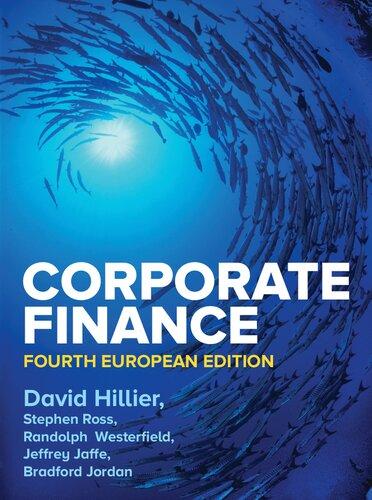3 What should companies do in the real world? Although this is clearly an important question, it...
Question:
3 What should companies do in the real world?
Although this is clearly an important question, it is, unfortunately, a hard one – perhaps too hard to answer definitively. Nevertheless, let us begin by working with the highest tax rates for a specific country, the UK. As of 2020, the corporate tax rate was 18 per cent. For investors in the highest tax bracket, interest income was taxed at 45 per cent (46 per cent in Scotland). Investors in this highest bracket faced an effective 38.1 per cent tax rate on dividends (after the first tax-free £2,000 of dividend income).
At these rates, the left side of Equation 18.7 becomes (1 – 0.18) × (1 – 0.381), which equals 0.5076. The right side of the equation becomes 1 – 0.45, which equals 0.55. Because any rational firm would rather put £0.55 instead of
£0.5076 into its investors’ hands, it appears at first glance that firms should prefer debt over equity, just as we argued earlier. The relative differences between debt and equity in the UK have changed considerably in recent years with changes in tax rates. However, the debt advantage in the UK does not necessarily apply to other countries, where either debt or equity may have a distinct tax advantage.
Does anything else in the real world alter this conclusion? Perhaps: our discussion on equity income is not yet complete. Firms can repurchase shares with excess cash instead of paying a dividend. Although capital gains on equities in the UK are taxed at 20 per cent (after a tax-free allowance of £11,700), the shareholder pays a capital gains tax only on the gain from sale, not on the entire proceeds from the repurchase. Thus, the effective tax rate on capital gains is actually lower than 20 per cent. Because firms both pay dividends and repurchase shares, the effective personal tax rate on share distributions must be below 38.1 per cent.
This lower effective tax rate makes equity issuance less burdensome. For example, suppose that the effective tax rate on share distributions is 30 per cent (to reflect a combination of share repurchases and dividends).
From every pound of pre-tax corporate income, UK shareholders receive (1 – 0.18) × (1 – 0.3), which equals £0.574.
This amount is now more than the £0.55 that bondholders receive.
Given that bonds appear to have the tax advantage in the UK against cash dividends but not against share repurchases, does this mean that companies should issue equities and have share repurchases instead of paying dividends? It looks as if many firms have actually followed this logic with share repurchases now significantly more common than cash dividends.
There is also another reason for issuing equity instead of debt, and this is financial distress. We previously said that financial distress costs are an offset to debt’s tax advantage, causing firms to employ less than 100 per cent leverage. The same point applies in the presence of personal taxes. And as long as the personal tax rate on equity income is below the personal tax rate on interest, the tax advantage to debt is smaller in a world with personal taxes than in a world without personal taxes. Thus, the optimal amount of debt will be lower in a world with personal taxes than in a world without them.
In a large-scale research study of US firms, Lin and Flannery (2013) examined the impact of new tax regulation, which led to a tax cut only for individual investors. They found that the tax cut reduced firm leverage by about 5 per cent, and this effect was stronger for firms with lower marginal corporate tax rates and for firms without financial constraints. This was perhaps the strongest evidence to date that personal tax does have an important impact on capital structure.
Step by Step Answer:






